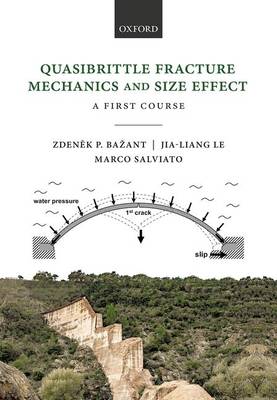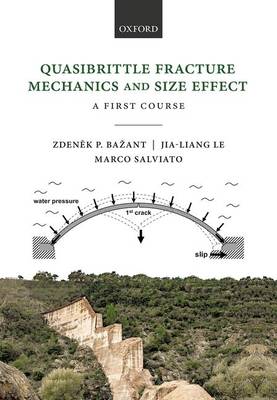
- Afhalen na 1 uur in een winkel met voorraad
- Gratis thuislevering in België vanaf € 30
- Ruim aanbod met 7 miljoen producten
- Afhalen na 1 uur in een winkel met voorraad
- Gratis thuislevering in België vanaf € 30
- Ruim aanbod met 7 miljoen producten
Zoeken
Quasibrittle Fracture Mechanics and Size Effect
A First Course
Zdenek P Ba%zant, Jia-Liang Le, Marco Salviato
Hardcover | Engels
€ 136,95
+ 273 punten
Omschrijving
Many modern engineering structures are composed of brittle heterogenous, or quasibrittle, materials. These include concrete, composites, tough ceramics, rocks, cold asphalt mixtures, and many brittle materials at the microscale. Understanding the failure behavior of these materials is of paramount importance for improving the resilience and sustainability of various engineering structures including civil infrastructure, aircraft, ships, military armors, and microelectronic devices. Designed for graduate and upper-level undergraduate university courses, this textbook provides a comprehensive treatment of quasibrittle fracture mechanics. It includes a concise but rigorous examination of linear elastic fracture mechanics, which is the foundation of all fracture mechanics. It also covers the fundamental concepts of nonlinear fracture mechanics, and introduces more advanced concepts such as triaxial stress state in the fracture process zone, nonlocal continuum models, and discrete computational models. Finally, the book features extensive discussion of the various practical applications of quasibrittle fracture mechanics across different structures and engineering disciplines, and throughout includes exercises and problems for students to test their understanding.
Specificaties
Betrokkenen
- Auteur(s):
- Uitgeverij:
Inhoud
- Aantal bladzijden:
- 336
- Taal:
- Engels
Eigenschappen
- Productcode (EAN):
- 9780192846242
- Verschijningsdatum:
- 19/01/2022
- Uitvoering:
- Hardcover
- Formaat:
- Genaaid
- Afmetingen:
- 210 mm x 279 mm
- Gewicht:
- 757 g

Alleen bij Standaard Boekhandel
+ 273 punten op je klantenkaart van Standaard Boekhandel
Beoordelingen
We publiceren alleen reviews die voldoen aan de voorwaarden voor reviews. Bekijk onze voorwaarden voor reviews.











